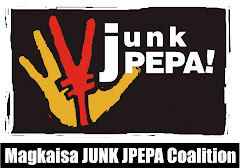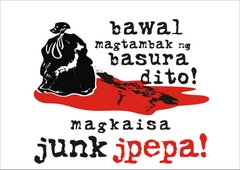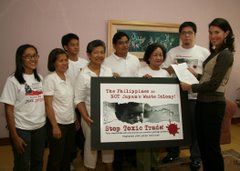JPEPA:A Clear And Present Danger To The Automotive
And Iron And Steel Workers
And Iron And Steel Workers
More than 3,000 workers belonging to the Philippine Metalworkers' Alliance (PMA) today trooped to the Senate to add their voices to the growing clamor for the rejection of the onerous Japan-Philippines Economic Partnership Agreement (JPEPA).
"JPEPA presents a clear and present danger to the automotive and iron and steel workers in the country," Frank Mero, national president of the PMA and of the Automotive Industry Workers' Alliance (AIWA). "In its present form, the jobs of that least 77,000 as well as tens of thousands of iron and steel workers whose livelihoods depend, directly or indirectly, on the automotive industry are imperiled as JPEPA threatens to destroy the country's automotive industry," he added.
Photo by Gigie Cruz/GAIA.
 In the Senate hearing, Frank Mero pointed out that Article 27 of the JPEPA agreement would pave the way for the legalization of used four-wheeled motor vehicles. "This is in violation of Executive Order 156," Mero pointed out.
In the Senate hearing, Frank Mero pointed out that Article 27 of the JPEPA agreement would pave the way for the legalization of used four-wheeled motor vehicles. "This is in violation of Executive Order 156," Mero pointed out.EO 156 was issued way back 2002, which prohibits importation of second-hand vehicles, not only to protect the country's fledging automotive industry but also to protect the public from unsafe vehicles that fail to meet the country's environmental standards.
Article 27 was not in the original text of the agreement. "Like several provisions in JPEPA, Article 27 was inserted by our negotiators in the course of the bargaining. The question is, why did our negotiators insert this provision and in whose interest? Surely it is not for the automotive industry and its workers," Mero stated.
Compared to the economic partnership agreements made by Thailand, Indonesia and Malaysia with Japan, JPEPA is an inferior agreement. "Nowhere in the Thai, Indonesia and Malaysian agreements with Japan would you find the same provision that we have in Article 27 of JPEPA," Mero explained.
Photo by Gigie Cruz/GAIA.
 "More importantly, our neighbors have even succeeded in providing better protection for their automotive industry in their EPAs with Japan," Mero said. "Why did our negotiators fail to do the same?"
"More importantly, our neighbors have even succeeded in providing better protection for their automotive industry in their EPAs with Japan," Mero said. "Why did our negotiators fail to do the same?""Clearly, our negotiators have sold us out!" Mero declared.
The workers joined hands with thousands of other workers, peasants, fisherfolk, women, urban poor and youth who joined the rally led by Junk JPEPA.
More photos:
All pictures by Gigie Cruz/GAIA.










No comments:
Post a Comment